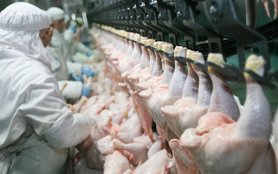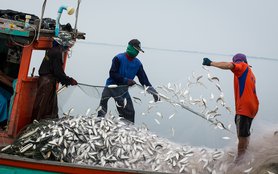As hunger escalates around the world, it’s urgent for Congress to strengthen and reauthorize the Global Food Security Act. What’s preventing swift and strategic action?
As the edge of hunger grows sharper for millions of people around the world, it’s incumbent on Congress to improve and expand the Global Food Security Act (GFSA).
An escalating hunger crisis demonstrates the grave state of global food insecurity. The effects of climate change, COVID-19, soaring food costs, and conflict are sending about 828 million people to bed hungry tonight. Roughly 50 million people in 45 countries are facing extreme hunger.
GFSA is designed to help prevent hunger emergencies–and, by coincidence, is due for a five-year reauthorization before expiring next year. Surely, the current crisis demands a stronger GFSA–yet legislation introduced in the US House would maintain the status quo.
Preventing hunger crises
Knowing that an ounce of prevention is worth a pound of cure, the late Senator Richard Lugar (R-IN) first introduced the Global Food Security Act in December 2008, in response to a hunger crisis of that time. He and other early champions–including Senator Bob Casey (D-PA), Senator Johnny Isakson (R-GA), Congresswoman Betty McCollum (D-MN), and Congressman Ed Royce (R-CA)–believed that the US response to hunger emergencies should involve saving lives in the short-term while also empowering local communities abroad to prevent hunger and beat poverty through agricultural development.
The bill finally became law in 2016 with an authorization of $1 billion per year. It is the primary authority behind USAID’s Feed the Future program.
Results from the initiative are encouraging. Partnerships and investment in farmers (especially women and smallholders) have boosted productivity, improved climate resiliency, and increased incomes in Feed the Future’s target countries.
Yet it is a limited program, with only twelve target countries in 2022. A temporary expansion has been announced, but this is dependent on supplemental funds, and could be a short venture without a greater funding authorization in the new GFSA. Lasting agricultural development requires time and commitment.
Empowering countries to feed people
Today’s overwhelming need, paired with the program’s potential, should have set the stage for, as former World Food Program Director Jim Morris has requested, “an ambitious expansion of GFSA to add more countries, so they can feed their [own] people despite threats from mother nature and foreign war.” Along with other NGOs, Oxfam recommends that funding be increased to $2 billion per year.
Equally, years of experience should have set the stage for a GFSA reauthorization that builds on lessons learned to increase effectiveness: prioritize women, climate adaptation, local ownership, and transparency.
This is why the initial GFSA reauthorization text in the House (H.R. 8446) is profoundly disappointing. Instead of an ambitious expansion, the bill would cut funding when adjusted for inflation (since 2016); it only moves the authorization from $1 billion to $1.1 billion per year. Instead of clearly mandating climate adaptation, the word “climate” is absent. Opportunities to better lift up women and local ownership are also missed.
Oxfam believes in Feed the Future and GFSA, imperfect though they may be; today’s hunger crisis would be even worse without them.
Time to demand a stronger, more strategic effort on hunger
While we know that the legislative process almost always involves compromise (as was true for the original GFSA), the truth is that H.R. 8446 currently falls far too short--especially in the context of a severe hunger crisis with no end in sight.
Thousands of Oxfam supporters advocated for years until the bill was passed in 2016. Nearly 33,000 people have signed a petition to Congress calling for an ambitious expansion of GFSA. We are committed to work with Congress to ensure the final bill is appropriate to the moment: with increased funding, improved priorities, and a stronger mandate.
______________________________________________________________________



